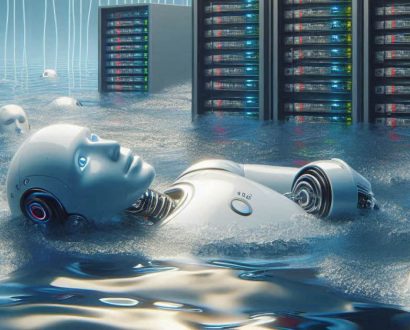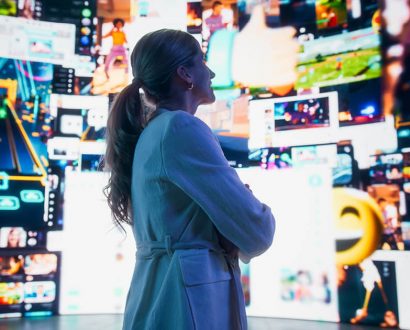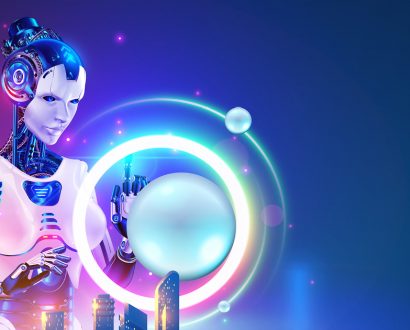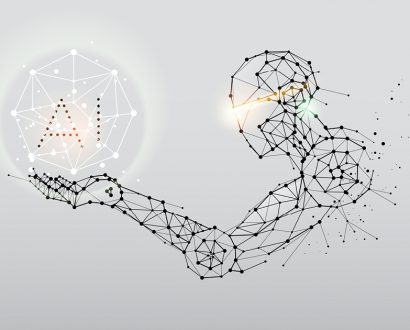If Leonardo da Vinci was transplanted into today’s world, he wouldn’t faff about painting half-smiling ladies (we have Instagram now); he’d be designing rockets, planning missions to Mars, and making self-driving cars that produce no dangerous gases and actually look good.
In short, he would be Elon Musk, a man who has taken the geekiness, genius and business savvy of Bill Gates and made it hip. There’s no question that Musk is an extraordinary visionary, and perhaps the mensch of multitaskers, but what he’s done, what makes him different, is that he regularly announces he’s going to do something implausible – build a rocket company from nothing that will end up carrying NASA payloads, and then people, into space; take on the global car industry and beat it to the punch badly with the first truly beloved electric car – and then does it.
So when Musk says he plans to send people to Mars in 2023, and then colonise the planet in the half century after that, you can’t help but acknowledge it as a genuine possibility. And when he predicts that we might actually need an interplanetary escape plan, because we’re designing artificially intelligent computers that he believes may one day wipe us out, you have to take him very seriously indeed.
Elon Musk comes to South Australia’s rescue
Remarkably, when he’s not busy trying to save the world or working as the chief designer at both his SpaceX and Tesla companies, or parenting his five children, Musk somehow squeezes in the time to fly to a far-off corner of the planet to help a sparsely populated state called South Australia with its energy problems.
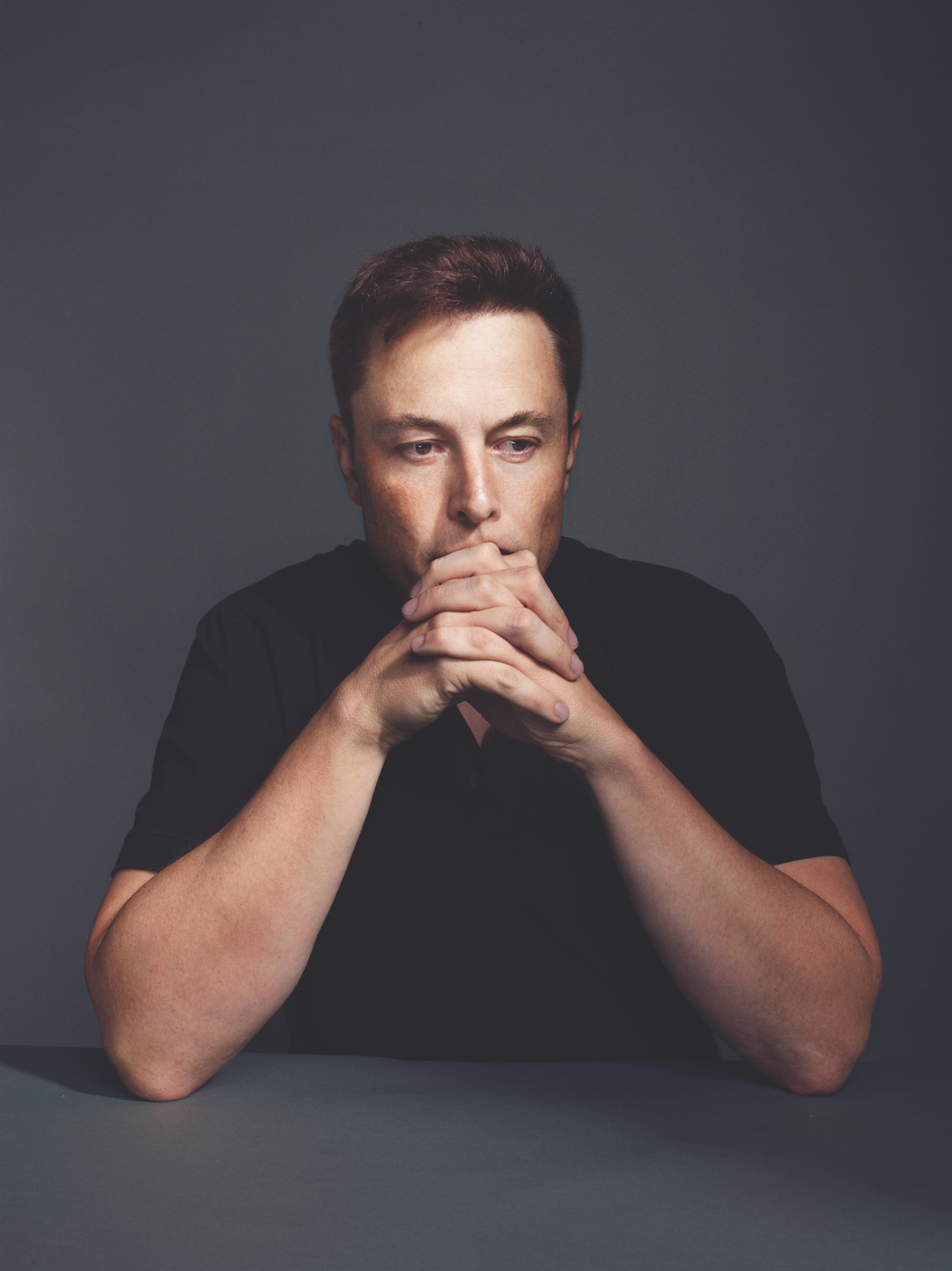
When something is important enough, you do it even if the odds are not in your favour.
Typically, the possibility of the battery-storage side of his Tesla company coming to the rescue by building a 100-megawatt lithium-ion battery – more than three times the size of anything ever attempted before – was not even swimming around in Musk’s swirling brain a year ago.
The whole thing was prompted by Australia’s Atlassian billionaire entrepreneur Mike Cannon-Brookes “talking smack”, as Musk describes it, back in March on Twitter and challenging him to come up with a solution to the state’s shaky and unreliable power grid.
Instantly, Musk made a promise that he could make it happen, and then doubled down by promising to install his mega-battery system within 100 days of contracts being signed – or he’d build it for free. Sure enough, on 7 July, there was a smiling Musk (and why wouldn’t a man worth north of $20 billion be grinning) in Adelaide, signing up to make the bet happen.
Musk on a mission to get to Mars
It will, of course, be worth “a very large sum” of money to his company and his shareholders, but Musk, now the forty-fourth-richest man in the world, according to Forbes, has said he’s only interested in gathering wealth so he can blow it all on going somewhere he can’t spend any of it: Mars, a planet he says he’d be willing to die on. But “not on impact”.
“I really do not have any other motivation for personally accumulating assets except to be able to make the biggest contribution I can to making life multiplanetary,” Musk says. Writing in the journal New Space, Musk outlined his plan to create a Mars colonial fleet of 1,000 spacecraft that would make multiple journeys to the red planet, building up a population of more than a million over the next 40 to 100 years.
When Musk says he plans to send people to Mars in 2023, and then colonise the planet … you can’t help but acknowledge it as a genuine possibility.
Clearly, his vision extends well beyond his own lifetime, but he isn’t just a slightly dreamy mad scientist. As the success of his electric-car company has shown, Musk is also a master marketeer, and he’s already working on selling Mars. “It would be quite fun to be on Mars because you would have gravity that is about 37% of that of Earth, so you would be able to lift heavy things and bound around,” he says.
As for the epic rocket ride of between six and nine months to get there – the first of which is set to launch in 2023 – Musk promises it will be “fun and exciting”. “It cannot feel cramped and boring. Therefore, the crew compartment or the occupant compartment is set up so that you can do zero-gravity games. You can float around. There will be movies, lecture halls, cabins and a restaurant. It will be really fun to go. You are going to have a great time.”
Musk, of course, would have to have an office and a lab on his space ship because he could never go that long without working. It is, frankly, exhausting just to list all of the things he has done, or is about to do.
Realising his dreams with SpaceX
Born in 1971 in Pretoria, South Africa, he taught himself computer programming at the age of 12 (more recently, he also taught himself how to design and build rockets, because who needs rocket scientists?) and designed and sold his own video game. Predictably, he was bullied mercilessly at school as a nerd, but if success is the best form of revenge, those bullies must be weeping now.
In 1995, he set up a web-software company called Zip2, with just US$28,000 capital, and four years later he sold it for more than US$307 million. His next project – PayPal – probably sounds more familiar. That one was eventually bought by eBay for US$1.5 billion.
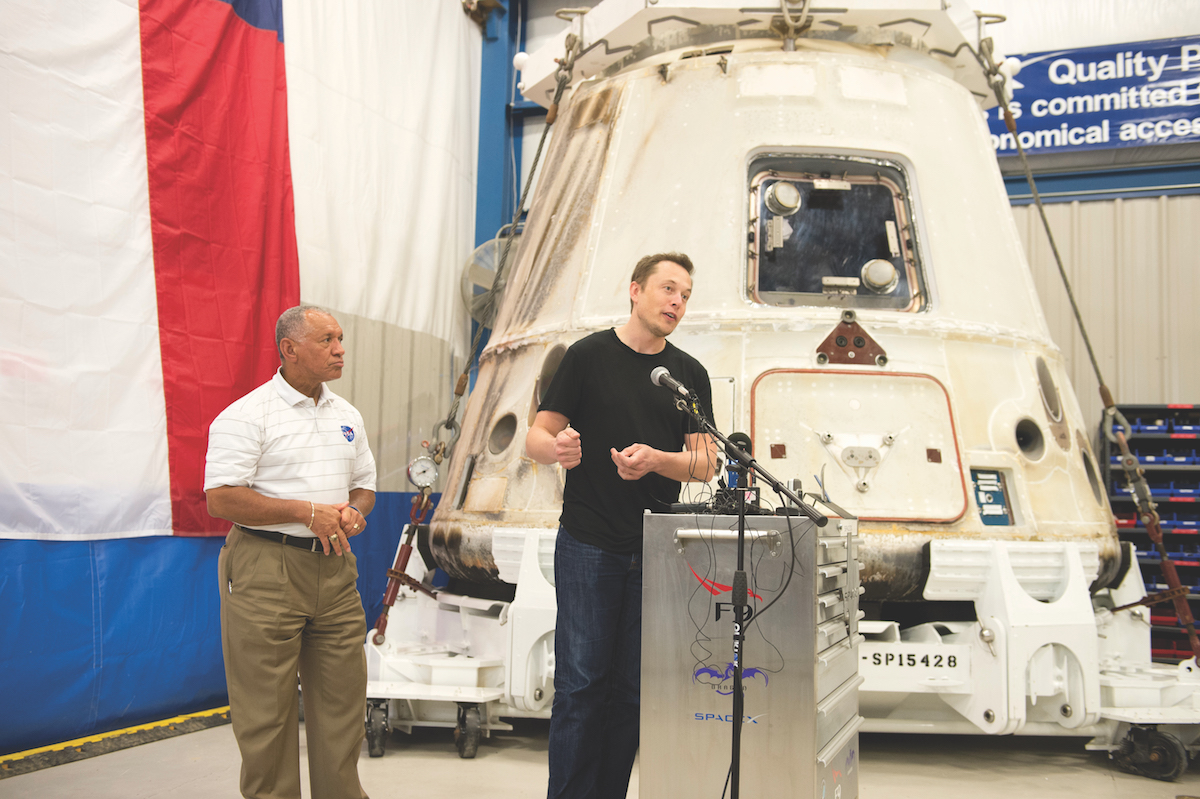
Those early money-making ventures allowed Musk to focus on his dreams, establishing SpaceX with US$100 million of his own money in 2002. By 2008, his company had become the first private entity to successfully launch a satellite into Earth’s orbit, and since then it’s been working on making rockets reusable – thus cutting costs enormously – by landing them on floating ocean platforms. The company has also announced plans to send two rich space tourists around the moon early next year, and to develop cargo rockets that can transport goods from New York to Tokyo in 10 minutes.
With his hands-on approach, SpaceX alone would be enough to exhaust most CEOs, but almost simultaneously Musk was becoming arguably more famous for launching the biggest disrupter the motoring world had seen since the invention of the wheel: Tesla, of which he became very much the public face in 2004.
Reinventing the car with Tesla
As the company’s CEO and product architect since 2008, Musk has been compared to Henry Ford for his attempts to reinvent the motive force of cars, and the way we (don’t) drive them, thanks to his autonomous Autopilot system.
While early Teslas were expensive and premium (its Model S was the top-selling luxury sedan in the US last year), he has announced the development of a cheap, mass-market version, the Model 3, which will sell for around US$35,000 and has already taken more than 450,000 pre-orders worldwide. Deliveries started in July.
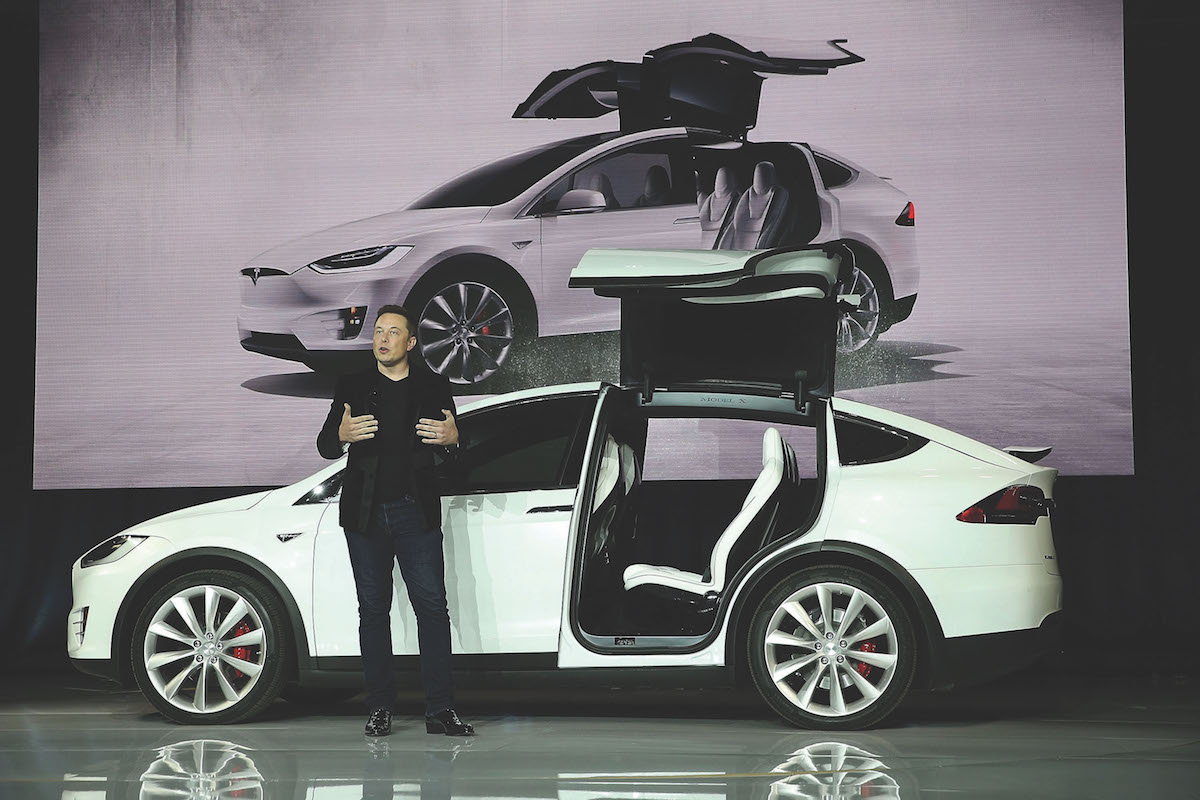
Once again, Tesla is about more than money, though; it’s about Musk wanting to save the world from further environmental harm by running its car fleet on renewable electricity – which is why he releases all the patents he’s developed for Tesla for free, to encourage other companies to build EVs and compete with him.
He’s also competing with himself in the transport space, of course, since coming up with another mind-bending invention – the Hyperloop – in 2013. Basically an electromagnetic bullet train, built inside a tube, under the ground, and riding on a cushion of air, the Hyperloop would fire people from Los Angeles to San Francisco at a staggering 1,100km/h, at a set-up cost of around US$6 billion.
Boring CEO, Elon Musk
You might be getting the idea that Musk has a restless mind, but there’s no better example than last December when, stuck in LA traffic, he tweeted about creating the Boring Company to dig tunnels under the city and rescue its people from “soul-destroying traffic”.
People thought he was joking, and some wags dubbed him, “Boring CEO, Elon Musk”, but by January he’d assigned a senior SpaceX engineer to work on the project and started digging his first test tunnel. July saw him declare a “verbal government agreement” to build one such Hyperloop from New York to Washington DC – a journey expected to take a mere 29 minutes compared to almost four hours of driving.
In the midst of all this – and co-founding a solar-energy company, SolarCity, with his cousins in 2006 – Musk has admitted he finds time to engage in hard-partying playboy behaviour. He’s been married twice. As Vanity Fair put it: “It’s hard for mere mortal women to maintain a relationship with someone as insanely obsessed with work as Musk,” yet he somehow fits in being an involved weekend parent to five boys.
He’s no ordinary father, of course. When he was unhappy with the standard of his children’s education, he set up his own school called Ad Astra (it means “to the stars”), which has just 20 students, mostly born to SpaceX employees. Considering his workload, and the breadth of his interests, Musk seems almost superhuman, so it should come as no surprise that Robert Downey Jnr based his billionaire genius philanthropist character Tony Stark/Iron Man on Elon Musk. It’s a reasonable image reinvention for a bullied nerd.
Sounding the warning on artificial intelligence
What is almost as interesting as the physical developments Musk and his companies are working on are the things his mind is mulling over, like the future of AI, which he calls humanity’s biggest existential threat. “With artificial intelligence, we are summoning the demon” is how Musk infamously described it, sounding very much like a movie trailer. “You know all those stories where there’s the guy with the pentagram and the holy water and he’s, like, yeah, he’s sure he can control the demon? Doesn’t work out.”
Musk is friends with many of the people who are working on artificial intelligence, including Google co-founder Larry Page, and has invested in AI companies, mainly so he can keep his eye on what they’re up to. He doesn’t doubt that Page has good intentions, but he fears he could still “produce something evil by accident”.
“I don’t think people really understand just how quickly machine intelligence is advancing, particularly people outside of Silicon Valley,” he says. What he fears that we’re not worrying about enough is the possibility of unintended consequences.
“If there’s some digital super-intelligence and its optimisation or utility function is something that’s detrimental to humanity, it will have a very bad effect,” he told a Vanity Fair summit recently. “It could be just something like getting rid of spam email, so it concludes that the best way to get rid of spam is to get rid of humans, the source of all spam.”
Musk has been wrong about things before, of course, and some of his rockets have crashed, burned and drowned. For the sake of humanity, we can only hope his visionary abilities are out of focus when it comes to AI. Or that he will sell us a cheap seat to Mars
Musk facts
-
He was an adviser to Donald Trump
Unsurprisingly, that didn’t work out, with Musk quitting the President’s advisory councils, which he’d joined – along with other tech executives – a month after the election. Musk announced he
was quitting in June after Trump pulled the US out of the Paris climate accord. -
He’s a school dropout
Musk enrolled at Stanford University to study physics in 1995, but dropped out after two days when he decided that the internet gave him more opportunities to impact humanity.
-
He was a dreamer
As a child, Musk’s mother, Maye, would often find him staring silently into the distance and feared he was hard of hearing, leading doctors to remove his adenoids. It turned out he was just daydreaming, as she told his biographer, Ashlee Vance: “He goes into his brain, and then you just see he is in another world … Now I just leave him be, because I know he is designing a new rocket or something.”
-
He collects mansions
Musk has spent US$70 million on buying no less than five mansions in Bel Air, Southern California,
a billionaires’ playground. Because one mansion is never enough. -
He’s a Diet Coke fiend
Staying awake long enough to work the 100-hour weeks Musk was regularly pumping out during the early days of setting up his companies is not easy, so he hit the caffeine hard, averaging almost three litres of Diet Coke a day.
Plus some coffee. The results were predictably unhealthy, with Musk saying he was “so freaking jacked that I seriously started to feel like I was losing my peripheral vision”.


